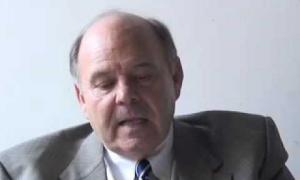The Rule of Law Is Not Just a Talking Point for Us. It Is an Operating Principle.
May 15, 2019
"The rule of law requires us to ignore partisan politics, tune out the news cycle, and base our decisions on credible evidence."
I represent the United States. Those are the opening words spoken by Department of Justice attorneys at every federal trial.
Each of us represents the entire United States. More importantly, we represent every one of its citizens. All ideologies and political affiliations. All races and religions. We represent supporters and critics. We represent victims and criminals.
Our oath of office begins with a promise to “support and defend the Constitution.” The point is to establish a legal duty that overrides loyalty to anybody else.
And in the final clause, we swear to “well and faithfully discharge the duties of the office.” You can only fulfill that pledge if you understand the duties.
I served under five Presidents and nine Senate-confirmed Attorneys General — or ten, if you count Bill Barr twice. I spent most of my career outside Washington, but I worked at headquarters for four years in the early 1990s as a prosecutor, four years in the early 2000s as a supervisor, and two years in my current job.
I frequently speak about the inspiration I draw from three aspects of the Main Justice building: the art it contains; the people it employs; and the principles it represents.
Every floor contains reminders of heroes, mentors, and friends. They taught me that political considerations may influence policy decisions, but when it comes to individual cases, our Department stands apart from politics.
Attorney General Jeff Sessions told us to follow regular order and ensure the nonpartisan administration of the law. That is what we did every day. And it is what the Department continues to do under Attorney General Bill Barr.
What is it that secures liberty in America? It is not just the words of the law. It is the character of the people.
When you exit this Great Hall and enter the courtyard, you see a Latin inscription: “Privilegium Obligatio.” It means that when you accept a privilege, you incur an obligation.
People who earn the privilege of joining this Department accept the obligation to seek the truth, serve the law, and faithfully follow our policies and procedures.
Richard Posner put it this way: “The Department of Justice wields enormous power over people’s lives, much of it beyond judicial or political review. With power comes responsibility, moral if not legal, for its prudent and restrained exercise; and responsibility implies knowledge, experience and sound judgment, not just good faith.”
Justice Department employees pass rigorous screening interviews and periodic background checks. With few exceptions, they demonstrate great intellect and integrity, patriotism and wisdom, courage and resilience.
No organization with 115,000 employees is error-free, but our virtuous culture and disciplined procedures promote objectivity and fairness. We comply with an array of laws, regulations, and ethical rules. We maintain experienced, nonpartisan internal watchdogs to investigate credible misconduct allegations, and we face external scrutiny by judges and bar authorities. We correct mistakes, and we punish wrongdoers.
The rule of law is not just a talking point for us. It is an operating principle.
The rule of law requires us to ignore partisan politics, tune out the news cycle, and base our decisions on credible evidence.
Many people dismiss facts that contradict their preexisting beliefs. But we face the exacting scrutiny of the federal courtroom. That imposes a powerful discipline.
We cannot prove our cases with hearsay or anonymous sources. We need to produce eyewitnesses, satisfy the rules of evidence, and meet our burden of proof to the satisfaction of a neutral judge and an unbiased jury. Do you know how difficult it is to persuade 12 random people to agree about anything? We need unanimous support.
We face those demanding rules because our allegations carry severe consequences. The rules motivate us to seek only the truth.
Pursuing truth requires us to keep an open mind and avoid confirmation bias. Truth may not match our preconceptions. Truth may not satisfy our hopes. But truth is essential to justice.
The most important memento in my office is a plaque that says: “Don’t tell me what I want to hear. Just tell me what I need to know.” I enjoyed the support of an exceptional team that followed that advice. We stayed the course and accomplished the things we set out to do.
Many people in this room stood with me to defend the ramparts of justice. When we are in the right, we keep moving forward. Our confidence is not naïve. It flows from an appreciation of the history and traditions of this great institution.
One of the most important lessons for litigators is to begin with the end in mind: decide what evidence you need for your closing argument and stay focused on it throughout the ups and downs of the trial.
Trial lawyers understand that the most dramatic moments may have little impact on the verdict. We learn to ignore fleeting distractions and focus on the things that matter.
Consider what happens when you use a smartphone map. Many things can go wrong during your trip. Traffic may be unexpectedly heavy. Accidents can obstruct your path. You might make a wrong turn. But whenever unexpected challenges arise, the program calmly recalculates and keeps you on a path to your destination.
I am grateful to the relatives and friends who joined me on this journey. My wife Lisa made many sacrifices in support of my public service, particularly over the past two years.
My daughters Julia and Allison cheerfully tolerated the disruptions that arise when a parent is in the arena. In fact, congressional hearings are one of Julie’s favorite forms of entertainment! And Allie enjoys reminding me that I was mistaken when I told her that Deputy Attorney General is a low-profile job.
My parents, Robert and Gerri Rosenstein, never wavered in their confidence. Lisa’s mother, Alice Barsoomian, is another steadfast supporter. She arrived today with my sister-in-law Ilona Barsoomian, and her children Veronica and Patrick.
There are friends here from elementary school, high school, college, and law school. Judges and defense attorneys who shared some of my most memorable trial experiences. Colleagues and supervisors who guided me. Administrative employees who kept the work flowing. Law enforcement agents who spent nights and weekends with me interviewing witnesses. Prosecutors who joined me in the trenches.
These are the men and women of federal law enforcement. They are some of America’s best, brightest, and most patriotic citizens. They deserve our admiration and respect.
At my confirmation hearing, I pledged to defend the independence of the Justice Department; to protect public safety; to preserve civil rights; and to seek justice. I promised to draw on my personal experience with law enforcement officers and to promote public confidence.
I fought for those goals every day.
Government officials sometimes face pressure to compromise principles, perhaps even to trade virtue for the appearance of virtue. But we should exercise caution when uncomfortable circumstances tempt us to disregard timeless principles. It is most important to follow the rules when the stakes are high. Sticking with traditions is usually the best course – not always, but usually. After all, that is why they became traditions.
Thomas Jefferson reputedly gave this advice: “On matters of style, swim with the current. On matters of principle, stand like a rock.” The challenge is to distinguish between principle and style, between the things that mean the most and the things that mean the least.
Our Justice Department team focused on important goals. We used results-driven management to improve the Department’s efficiency and enhance the impact of its $28 billion budget. We made rapid progress on our law enforcement priorities – reducing violent crime, curtailing opioid abuse, protecting consumers, improving immigration enforcement, and building confidence in the police – while preserving national security and strengthening federal efforts in other areas.
This Department is not just in the law enforcement business. We represent the government in civil lawsuits. We counsel other agencies. We house prisoners. We administer grants. We collaborate with local, state, and tribal authorities, and with international partners. Our influence on America is broad and deep.
That influence gives us a platform to foster civility. Attorney General Robert Jackson said that “sensitiv[ity] to fair play and sportsmanship is perhaps the best protection against the abuse of power, and the citizen’s safety lies in the prosecutor who tempers zeal with … kindness, who seeks truth and not victims, who serves the law and not factional purposes, and who approaches [the] task with humility.” We follow that mandate every day. If kindness and humility are in short supply outside the walls of Justice, that is all the more reason for us to set a good example.
I joined the Department of Justice because I believe in the mission. I stayed because I believe in the people.
I watched you pursue justice with ceaseless devotion, often at personal sacrifice and sometimes at physical risk. It is a privilege to work with such honorable, principled, trustworthy public servants.
Some of my role models were famous political appointees, but many were career public servants like David Margolis, who was renowned for his irreverence and his love for this Department. David’s advice about integrity stayed with me over the past quarter century. I want to thank his wife, Debby, and his daughters, Kim and Cheri, for being here today.
In my final moments on this grand stage, I want to leave colleagues who remain behind these words from Edward Levi: “As law enforcement officials, you … hold a unique and difficult position of enormous responsibility to our society…. [M]any … citizens learn what kind of country this is [by watching you].” The things they learn, Levi said, include “what kindnesses and decencies we honor as a people.”
I hope you do your part to carry the baton of Justice with kindness and decency; and pass it safely to the next generation. And when you walk the halls of Main Justice, I hope they echo for you with the voices of heroes, mentors, and friends, as they do for me.
To those who taught me, those who worked beside me, and those who stood behind me, I am grateful for your friendship and thankful for your accomplishments.
Justice is in good hands. It is in your hands.
Thank you, and farewell.





